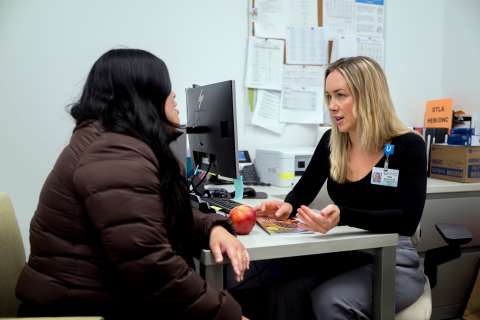The holidays may be “the most wonderful time of the year,” but for many of us, it’s also the busiest, most expensive and most emotionally challenging.
Dealing with a cancer diagnosis or other serious illness can make navigating the season of cheer even harder.
One way to create pockets of peace amid all the extra shopping, eating and socializing is by incorporating mindful moments into the day, says Porter Tolkin, MSW, a social worker with the Simms/Mann UCLA Center for Integrative Oncology.
Tolkin leads a mindfulness group for the Simms/Mann Center, which provides free psychosocial support for people undergoing cancer treatment at UCLA Health.
According to UCLA Mindful, mindfulness is the practice of paying attention to present-moment experiences with openness, curiosity and a willingness to be with that experience.
Mini moments of mindfulness don’t involve sitting down to meditate for 30 minutes. They’re found by simply slowing down enough to notice the experiences you’re having, Tolkin says: beholding a kind exchange, appreciating a beautiful decoration, feeling the crisp weather on your skin. Research suggests that even micro experiences of mindfulness in daily life help reduce stress.
The busy holiday season may not be the best time to start a daily meditation practice – “When something feels like a chore, it’s not going to be helpful for you,” Tolkin says – but small mindful moments can fit right into our seasonal obligations.
Here are some ways Tolkin suggests we can find these moments:
When preparing a dish …
See if you can focus on each element and action the recipe requires. When making mashed potatoes, for example, feel the warm water on your hands as you wash the vegetables. Notice the pressure and rhythm required to peel them. Be aware of the color and aroma as you chop and boil the potatoes. And feel the action of mashing them, how the texture changes.
“It’s really slowing down and enjoying the little things,” Tolkin says.
When getting ready to go out …
Let your shower be a time of restoration. It can be powerful to set an intention, Tolkin says, such as: “My intention of this shower is to really let the water wipe away all my stress and it’s going to be a reset.”
During the shower, tune into the sensation of the water hitting your skin, the smell of the shampoo, the feel of the soap suds. As you dry off afterward, notice the texture of the towel and the temperature in the room.
When traveling …
Let yourself become aware of the colors, sounds and smells around you. If you’re at an airport, notice all the hustle and bustle, the energy in motion. If you’re driving, take in the sights as you go; maybe turn off the radio and listen to the sound of the road beneath the tires. When out walking, let your senses awaken to the wind moving through the trees, smells in the environment, the feeling of your feet moving across the ground.
More tips
Because emotions can run high during the holidays, especially for people navigating health challenges, Tolkin offers these additional strategies for creating calm:
Try box breathing: Studies show this simple breathing technique effectively reduces stress. To try it, inhale for a count of four, hold your breath for four counts, exhale for four counts, and hold for four counts. Then repeat the cycle.
You can practice this breathing style silently to yourself and no one will know you’re doing it, Tolkin says.
Take a break: When you notice yourself feeling agitated, whether by a family situation or another circumstance beyond your control, try changing your scenery, Tolkin suggests.
“If you feel like you want to scream and yell and you catch yourself before you scream and yell, then go for a walk,” she says. “Change your room. Change your scenery.”
She also recommends checking into your senses to bring you into the present moment. Notice what you can see, hear, smell, touch and taste.
Practice self-compassion: Sometimes being mindful of the present moment means noticing how hard things are.
“If you’re going through treatment and things don’t look like you thought they would, really embracing that and saying, ‘This is horrible. This is hard,’” Tolkin says. “We can sit in the grief, but also look for where we can find space for more love, compassion and empathy.”
And then direct that kindness to yourself.





